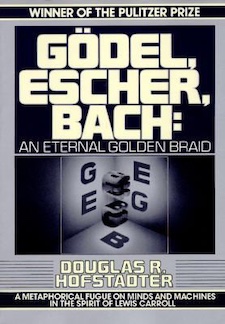If your curiosity about artificial intelligence goes beyond bookmarking those incessant “10 ChatGPT prompts you need to know” posts that are all over LinkedIn, you should set aside some time to read Douglas’ Hofstadter’s Gödel, Escher, Bach: An Eternal Golden Braid and watch his new interview.
Gödel, Escher, Bach
I might never have read it, if not for Dr. David Alex Lamb’s software engineering course at Queen’s University, whose curriculum included reading a book from a predetermined list and writing a report on it. I’ll admit that I first rolled my eyes at having to write a book report, but then noticed that one of the books had both “Escher” and “Bach” in the title. I had no idea who “Gödel” was, but I figured they were in good company, so I signed up to write the report on the book I would later come to know as “GEB.”
I’ll write more about why I think the book is important later. In the meantime, you should just know that it:
- Helped me get a better understanding of a lot of underlying principles of mathematics and its not-too-distant relative, computer science, especially the concepts of loops and recursion
- Advanced my thinking about how art, science, math, and music are intertwined, and inspired one of my favorite sayings: “Music is math you can feel”
- Gave me my favorite explanations of regular expressions and the halting problem
- Taught me that even the deepest, densest subject matter can be explained with whimsy
- Provided me with my first serious introduction to ideas in cognitive science and artificial intelligence
Yes, this is one of those books that many people buy, read a chapter or two, and then put on their bookshelf, never to touch it again. Do not make that mistake. This book will reward your patience and perseverance by either exposing you to some great ideas, or validate some concepts that you may have already internalized.
At the very least, if you want to understand “classical” AI — that is AI based on symbol manipulation instead of the connectionist, “algebra, calculus, and stats in a trench coat” model of modern AI — you should Gödel, Escher, Bach.
A new Hofstadter interview!
Posted a mere three days ago at the time of writing, the video above is a conversation between Douglas Hofstadter and Amy Jo Kim. It’s worth watching, not only for Hofstadter’s stories about how GEB came to be, but also for his take on current-era large language models and other generative AI as well as the fact that he’s being interviewed by game designer Amy Jo Kim. Among other things, Kim was a systems designer on the team that made the game Rock Band and worked on the in-game social systems for The Sims.
Watch the video — I’ll write more about it later.


One reply on “Douglas Hofstadter, “Gödel, Escher, Bach” and his take on the state of AI today”
[…] Read the complete article at: http://www.globalnerdy.com […]